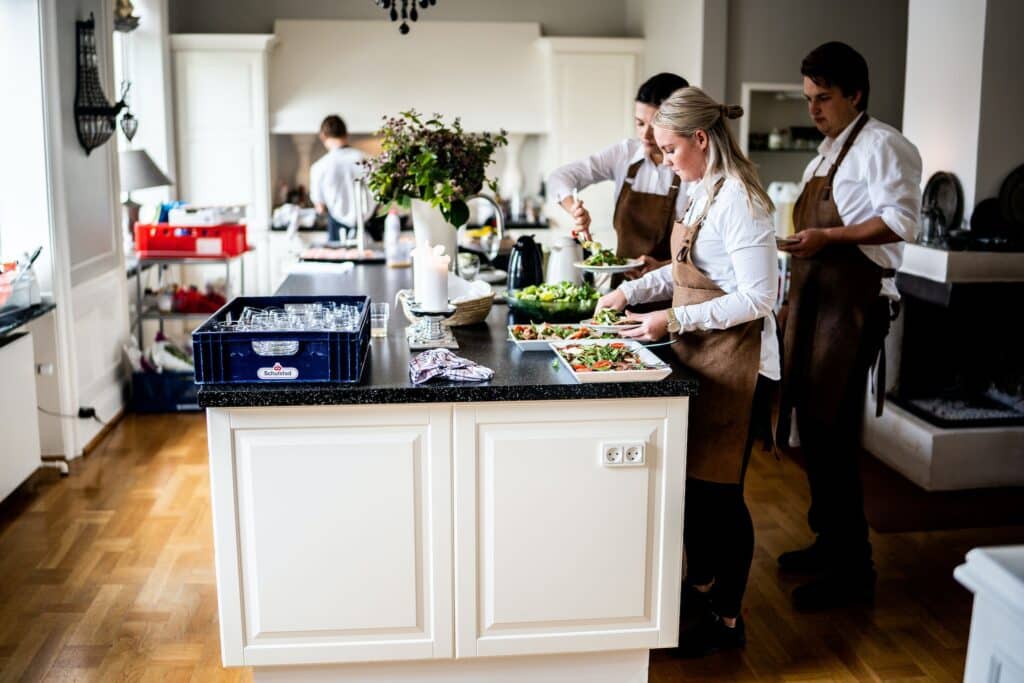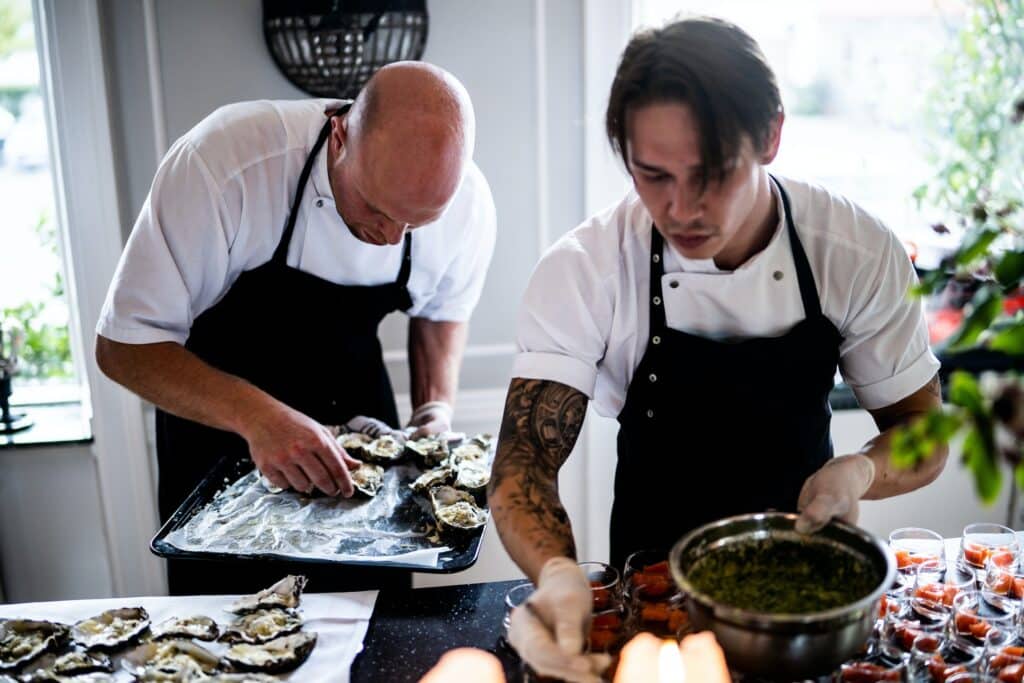Even though they are always working behind the counter but they know how to make a cuisine that will make the customers come back for more. With exceptional culinary skills and managerial skills chefs are easily one of the top restaurant recruits
This blog delves into the intricacies of recruiting chefs, catering specifically to the discerning eyes of recruiters in the gastronomy industry. From deciphering the diverse roles that chefs can inhabit to navigating the labyrinth of skill sets and culinary philosophies, this guide aims to provide a comprehensive toolkit for culinary talent acquisition. Join us as we explore each step, from crafting the perfect job description to conducting practical evaluations, and from negotiating compensation packages to ensuring seamless onboarding.
Understanding the culinary landscape
In the realm of culinary arts, the role of a chef extends far beyond the traditional image of a toque-clad professional expertly preparing meals. To effectively hire a chef that aligns with your restaurant or establishment’s vision, it’s essential to comprehend the diverse landscape of culinary expertise.
Categorically, chefs can be classified into various types based on their specialization, skills, and experience. Executive Chefs, often the creative masterminds behind the menu, orchestrate culinary operations. Sous Chefs assist in managing the kitchen, ensuring smooth workflows. Pastry Chefs bring sweet creations to life, while Sauciers specialize in crafting exquisite sauces. Additionally, there are specialized chefs like Garde Manger chefs, responsible for cold dishes, and Personal Chefs catering to individual clients.
Understanding these distinctions not only aids in accurately outlining job requirements but also in appreciating the unique skills each role demands. By recognizing the diversity within the culinary field, recruiters can better tailor their hiring approach. This knowledge empowers recruiters to ask targeted questions during interviews, evaluate candidates more effectively, and ultimately hire chefs whose skills and passions are in harmony with the culinary journey the establishment aims to undertake.
Deciding the specialty and skill level required
When embarking on the journey to hire a chef, one of the fundamental steps is defining your establishment’s culinary needs with precision. Deciding the specialty and skill level required lays the groundwork for finding the perfect fit.
Begin by examining your restaurant’s concept and menu. Are you known for a particular cuisine? Do you emphasize fine dining or casual comfort? Identifying your establishment’s culinary identity is pivotal in selecting a chef whose expertise aligns seamlessly.
Next, assess the skills needed for success in your kitchen. If your menu revolves around intricate pastries, a Pastry Chef with a flair for creativity and precision might be ideal. On the other hand, if your focus is on bold flavors and experimentation, an Executive Chef well-versed in fusion cooking could be the right choice.
It’s equally crucial to consider the skill level expected. Are you seeking an experienced leader to revamp your culinary operations, or are you open to mentoring a promising junior chef?
This strategic approach ensures that you not only identify a chef with the necessary technical skills but also a professional who resonates with your establishment’s culinary philosophy. Aligning your needs with a chef’s expertise creates a harmonious partnership that’s poised for culinary excellence.

Crafting the perfect job description
Crafting an effective job description is the cornerstone of attracting qualified chef candidates who align with your restaurant’s vision and needs. A thoughtfully constructed job description not only outlines responsibilities but also provides a glimpse into your establishment’s culture and expectations.
Begin with a clear and engaging job title that reflects the role’s level and specialization, such as “Executive Chef specializing in Modern Asian Fusion Cuisine.” A concise yet informative overview of your establishment can set the context for potential candidates, highlighting your culinary style and values.
Detail the key responsibilities and tasks expected of the chef. Whether it’s menu planning, team management, or maintaining quality standards, clarity here is paramount.
Include any specific technical skills or qualifications required, such as proficiency in certain cooking techniques or experience with specific cuisines.
Don’t overlook soft skills that contribute to a thriving kitchen environment, such as leadership, creativity, and adaptability. These traits can significantly impact team dynamics and the culinary experience for patrons.
Additionally, highlight any unique aspects of your restaurant – be it a commitment to sustainability, innovation, or a focus on local ingredients. This can attract chefs who resonate with your values.
Conclude with clear instructions for applying, including required documents and contact information. An enticing job description doesn’t just communicate a job; it communicates an opportunity to be part of a culinary journey that resonates with passionate chefs.
Key questions to ask a potential chef
The interview process is a crucial stage in hiring a chef that goes beyond evaluating skills and experience—it’s an opportunity to delve into their culinary philosophy, leadership style, and compatibility with your establishment. To ensure you’re making an informed decision, consider asking these key questions during the chef interview:
Tell us about your culinary background: This question provides insights into their training, experiences, and areas of specialization.
Describe a challenging kitchen situation you’ve handled: This reveals problem-solving skills, adaptability, and how they handle pressure.
What’s your approach to menu creation and innovation?: Discover their creativity, ability to keep up with trends, and adapt to your establishment’s culinary direction.
How do you manage and motivate your kitchen team?: Understand their leadership style, communication skills, and team-building strategies.
Can you share an example of a time you had to handle customer feedback or complaints?: This demonstrates their customer service orientation and professionalism.
What’s your stance on kitchen safety and sanitation?: Safety and hygiene are paramount in a kitchen; ensure they prioritize these aspects.
How do you handle ingredient sourcing and menu costing?: Gauge their financial acumen and ability to balance creativity with profitability.
Tell us about a successful collaboration you’ve had with front-of-house staff: This highlights their ability to work harmoniously with other departments.
How do you stay updated with industry trends and new techniques?: Assess their commitment to continuous learning and growth.
What do you find most exciting about joining our culinary team?: This gauges their interest and alignment with your establishment’s unique attributes.
These questions offer a comprehensive view of the chef’s skills, personality, and compatibility, aiding in making a well-informed hiring decision that benefits both the culinary team and the establishment as a whole.
Conducting a cooking test for candidates
In the quest to hire a chef who not only talks the talk but also walks the walk, incorporating a cooking test into the evaluation process can be a game-changer. This hands-on approach allows you to witness a candidate’s culinary prowess, decision-making under pressure, and adaptability in a real kitchen scenario.
During the live cooking test, provide the candidate with a specific dish to prepare within a given timeframe. This could be a signature item from your menu or a challenge that showcases their skills. Observe their techniques, organizational abilities, and attention to detail.
Assess their ability to multitask, manage time effectively, and maintain composure in a bustling kitchen environment. Additionally, observe their creativity—do they add personal touches while adhering to the established recipe?
While technical skills are crucial, also gauge their hygiene practices, kitchen safety awareness, and how they handle equipment. Their professionalism and respect for the kitchen space are reflective of their overall attitude towards their craft.
A live cooking test not only helps you assess their skills but also gives the candidate a taste of your kitchen culture and expectations. It’s a win-win, as you gain firsthand insights into their culinary capabilities while they gain a genuine understanding of the challenges and dynamics of your establishment.
Checking references and background
As you move closer to selecting the ideal chef for your team, conducting thorough reference and background checks is a crucial step to validate the candidate’s credibility, work history, and ensure the safety and integrity of your establishment.
Start by reaching out to the references provided by the candidate. Former employers, colleagues, and supervisors can provide valuable insights into their work ethic, team dynamics, and areas of expertise. Ask about their performance, leadership skills, and ability to handle challenges.
Additionally, consider conducting a background check to verify their educational qualifications, employment history, and any potential criminal records. This step is particularly important when dealing with sensitive roles in the culinary industry.
Online professional platforms and social media can also provide a glimpse into the candidate’s online presence, showcasing their engagement within the culinary community and their alignment with industry standards.
By meticulously checking references and backgrounds, you can gain a comprehensive understanding of the candidate’s past experiences and behaviors, which helps ensure a seamless fit within your culinary team. This due diligence safeguards your establishment’s reputation and fosters a secure and productive kitchen environment.

Striking a balance between budget and quality
Navigating the delicate process of negotiating a chef’s salary and benefits requires a strategic approach that balances your establishment’s budget constraints with the value the chef brings to your culinary team. Finding this equilibrium ensures both parties are satisfied and motivated for a successful collaboration.
Begin by conducting thorough research on industry standards for chefs with similar skills and experience. This knowledge provides a benchmark for your negotiations and helps you offer a competitive compensation package.
During negotiations, emphasize the unique aspects of your establishment that enhance the chef’s professional growth and creativity. Highlight any opportunities for menu innovation, exposure, or skill development that can justify a higher compensation.
Simultaneously, consider the benefits you can offer beyond monetary rewards. Healthcare plans, performance-based bonuses, professional development opportunities, and a healthy work-life balance can significantly influence a chef’s decision.
Stay open to discussions and be prepared for a collaborative exchange. Understanding the chef’s expectations and goals can help tailor the compensation package to their needs while also aligning with your establishment’s financial realities.
Remember, a well-compensated chef is more likely to be motivated, committed, and dedicated to elevating your culinary offerings. Striking the right balance between budget and quality ensures a win-win scenario that supports both your establishment’s growth and the chef’s career aspirations.
Onboarding and integration
Bringing a new chef on board marks the beginning of an exciting culinary journey for your establishment. Effective onboarding and integration play a pivotal role in ensuring a smooth transition, fostering a sense of belonging, and setting the stage for your new chef’s success.
Start by providing a comprehensive orientation to your restaurant’s culture, values, and kitchen protocols. Introduce them to the team and provide an overview of roles and responsibilities to promote a seamless integration into the kitchen dynamics.
Create a personalized training plan that aligns with the chef’s strengths and areas for development. This can include menu familiarization, kitchen procedures, and any unique techniques your establishment employs.
Foster open communication by designating a mentor or supervisor who can offer guidance, answer questions, and provide feedback as the new chef settles in.
Encourage collaboration by involving the new chef in menu planning sessions or team meetings. This not only showcases their skills but also makes them feel valued and invested in the establishment’s success.
Regular check-ins during the initial months help gauge their progress, address any challenges, and provide constructive feedback for continuous improvement.
Remember, a successful onboarding process contributes to higher job satisfaction, reduced turnover, and ultimately, culinary excellence. By investing in a structured integration plan, you’re not only setting up your new chef for success but also enhancing the overall cohesion and productivity of your culinary team.
Conclusion
In the ever-evolving culinary landscape, hiring a chef isn’t merely about filling a position; it’s about selecting a creative visionary who shapes the very essence of your establishment’s gastronomic journey. Through the facets of specialization, practical evaluations, and strategic negotiations, recruiters have the power to curate a team that crafts extraordinary culinary experiences.
The symphony of flavors, textures, and aromas that chefs orchestrate isn’t just confined to the plate; it resonates with the ambiance, culture, and identity of your establishment. By embracing the insights offered in this guide, recruiters can wield the expertise needed to harmonize the talents of these culinary virtuosos, setting the stage for a symphony of culinary excellence that leaves an indelible mark on both palates and memories.
Testlify offers a range of assessments and challenges that allow you to gauge candidates’ knowledge, problem-solving skills, and creativity in real-world scenarios. With Testlify, you can administer real-world challenges that simulate the actual assessment process, giving candidates the opportunity to showcase their skills and approach. The platform provides a structured and standardized assessment process, allowing you to compare candidates objectively and make informed decisions. By incorporating Testlify into your hiring process, you can ensure a more comprehensive and reliable evaluation of candidates, ultimately helping you identify the most qualified individuals for your team.
With our extensive test library, you can objectively evaluate candidates’ abilities, ensuring you shortlist the most talented individuals efficiently. Ready to unlock the potential of your hiring process? Book a free 30-minute live demo with Testlify. Our expert team will guide you through the platform, showcasing relevant skill tests tailored to your organization’s needs. With our support, you can streamline candidate selection, saving valuable time and resources.








